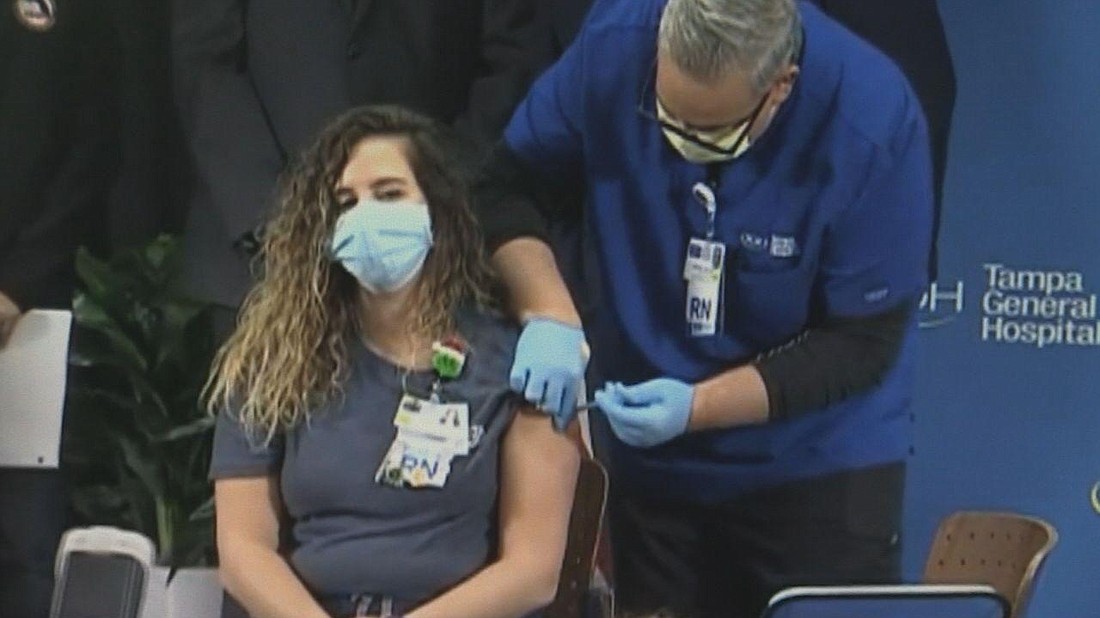- January 16, 2025
-
-
Loading

Loading

Two major Florida hospital systems say they will carry out a plan announced Thursday, Sept. 9, by the Biden administration to require hospital workers to be vaccinated against COVID-19 -- but concerns remain about how it could affect staffing.
Tampa General Hospital and the Tampa Bay region’s BayCare system said they will take steps to comply, but BayCare CEO Tommy Inzina issued a “letter to the community” that described a “conundrum” that hospitals have faced because of severe staffing shortages during the pandemic.
Inzina said BayCare has encouraged people to get vaccinated but “has had to balance the community’s broader health care needs -- from delivering babies to providing emergency room services -- against the possible impact on staffing of a mandatory vaccine requirement.”
And while BayCare will carry out the Biden administration plan, Inzina pointed to concerns that the vaccine mandate could lead to workers leaving.
“Mandating the vaccine will lead to a higher staff vaccination rate, but it remains unknown how many health care workers it will prompt to leave the industry,” Inzina wrote. “In recent months, as our hospitals filled with record numbers of sick patients, we knew we risked alienating a not-insignificant number of our team members. If even a small fraction of our non-vaccinated team members choose to exit the workforce rather than get vaccinated, we’d have even fewer team members to take care of patients, COVID or otherwise.”
With Biden’s plan, however, “circumstances have changed,” Inzina wrote.
“As we have learned repeatedly during this pandemic, we must be flexible and adapt as circumstances require,” the letter said. “We will work to implement this mandate on the timeline the government prescribes and simultaneously ensure quality health care for our community.”
After announcing last month that it will require nursing-home workers to be vaccinated against COVID-19, the Biden administration said Thursday it will expand the requirement to hospitals and other types of health-care facilities.
The federal Centers for Medicare & Medicaid Services said providers including hospitals, dialysis facilities, ambulatory surgical centers and home health agencies will have to meet staff vaccination requirements as a condition for participating in the Medicare and Medicaid programs. The agency said an interim final rule is expected to be issued in October.
Tampa General said in a statement it has urged employees to be vaccinated since December and that 74 percent had received the shots as of Monday.
“Tampa General will continue to educate on the importance of the vaccine and make it readily available for all of our team members,” Tampa General’s statement said. “As with everything, the safety and care of our patients, team members and community is our number one priority.”
Debate has swirled for months about whether hospitals and other health-care providers should require employees to be vaccinated. The Ascension health-care system, for example, issued a news release in late July that said it would require employees to be vaccinated by Nov. 12.
“Ascension will require that all associates be vaccinated against COVID-19, whether or not they provide direct patient care, and whether they work in our sites of care or remotely,” the news release said. “This includes associates employed by subsidiaries and partners; physicians and advanced practice providers, whether employed or independent; and volunteers and vendors entering Ascension facilities.”
But like the BayCare CEO, the American Hospital Association issued a statement Thursday that pointed to concerns about the effects on staffing.
“We look forward to reviewing the details related to today’s (Thursday’s) announcement of these new policies in regard to implementation, timing and the need for appropriate exceptions to accommodate medical and religious concerns,” American Hospital Association President and CEO Rick Pollack said in the statement. “As a practical matter, this policy may result in exacerbating the severe workforce shortage problems that currently exist. Consequently, given the critical challenges that we are facing in maintaining the resiliency of our workforce, and dealing with severe shortages, which the American Nurses Association has called a national crisis, we call on the administration to work with us as partners in developing aggressive and creative strategies to address this matter to ensure that hospitals and health systems on the front lines of fighting the battle against COVID-19 have the necessary human resources to both win this battle and maintain essential health services for the patients and communities we serve.”